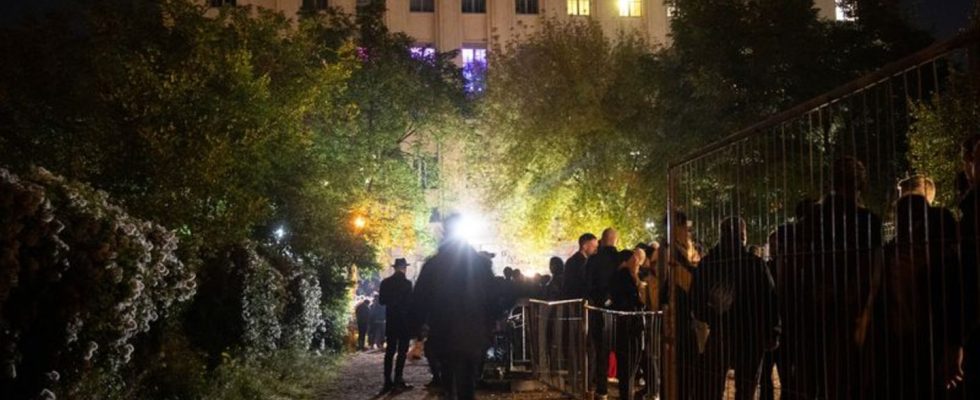Voting from the trade magazine “DJ Mag”: “Hï” is still the best club in the world on Ibiza. In Germany, Berlin’s “Berghain” has to admit defeat to a Cologne club again.
According to the rankings of the trade magazine “DJ Mag”, the “Bootshaus” in Cologne is among the five best clubs in the world. The dance location on a remote shipyard area under a Rhine bridge at Mülheim Harbor will make it to fifth place in the top 100 clubs in 2024, thus climbing one position, as “DJ Mag” announced. In the trade magazine’s voting, Cologne once again wins the intra-German duel: Berlin’s “Berghain” comes in 13th place (previous year: 16).
There are also two other clubs in Germany – both in Berlin – represented in the top 100. “The “Watergate” also makes up ground again and makes it to 34th place (up four). Only the “Tresor” continues to lose places: the Berlin cult site falls five places to position 77.” Overall, the German clubs are “on the rise a little bit after losing all of their places last year.”
Best club in the world in Ibiza – for the third time
According to the list, the best club in the world is the “Hï Ibiza” for the third time in a row. Only the “Green Valley” in the Brazilian coastal town of Camboriú has previously achieved a triple – from 2018 to 2020. This time this club is in second place.
This year’s party season starts at “Hï” next weekend. Entry to the club with palm trees, not far from the Mediterranean beach and just a few kilometers from Ibiza Town, costs between around 60 and 120 euros, depending on the weekend.
“Hï Ibiza, which opened its doors on the legendary Playa d’en Bossa in 2017, is one of the most technologically advanced dance music destinations in the world,” writes “DJ Mag” about the number one club. It boasts a list of top-class resident DJs, including Black Coffee, David Guetta, Eric Prydz, Fisher and The Martinez Brothers.
Europe is most frequently represented in the ranking
Behind the third-placed club, the “Echostage” in Washington, another party venue in the Ibiza beach resort of Playa d’en Bossa (Catalan: Platja d’en Bossa) comes in fourth place: the “Ushuaïa”. It’s basically on the other side of the street from “Hï”.
The five most frequently listed countries in the top 100 are the USA, Spain, Great Britain, Brazil and Croatia. The most represented continent is Europe. Clubs from almost 40 countries are listed, making the top 100 of 2024 “perhaps the most international list yet,” as DJ Mag puts it. From Switzerland, the “MAD Club” is represented in Lausanne (52nd place (up seven)).
There are 16 newcomers. These are the most since the 2020 vote, which was published exactly at the time when the world began to struggle with the corona pandemic. The 2024 voting now gives a clear “indication of the recovery of the electronic music scene after the pandemic”.
The mood in the German party scene is less enthusiastic
In Germany, the mood in the party scene is less enthusiastic, more “ambivalent,” as Lutz Leichsenring, member of the board of the Berlin Club Commission, recently told the dpa. The Clubcommission is an association of party and cultural event organizers in the German capital. Almost all operators struggled with financial difficulties.
These included general cost increases, lower overall sales and increased rents. This is causing some clubs to increase prices. “This is an additional difficulty because the audience’s financial situation does not allow them to pay more,” said Leichsenring.
Many of the problems that currently exist are long-term consequences of the pandemic. Nevertheless, you can see that a young audience is slowly moving in, who initially had no access to clubs due to the restrictions during the corona pandemic.
Regarding the legalization of cannabis for adults, which came into force on April 1st, Leichsenring said: “We don’t think that much will change in the clubs. We knew before legalization that it is part of the reality of life for many people in this city, too Consuming cannabis.”
Techno in Berlin is cultural heritage
The international club scene is considered to be quite addicted to drugs. That’s why “Berghain” has an awareness guide on its website with sentences like “Poly-drug use or mixing it with alcohol should be avoided at all costs” or “Sleep is essential and not a personal flaw (…) – give your bodies a break .”
In mid-March, Germany added “Technoculture in Berlin” to its list of intangible cultural heritage, which now includes around 150 entries. This was decided by the Conference of Ministers of Education and Cultural Affairs. Club operators may also be hoping for government support from the new status as a cultural asset. According to the club commission, fights over limited space are increasingly threatening techno culture and thus Berlin’s status as a hub for electronic music.
Minister of State for Culture Claudia Roth emphasized that the club scene as an intangible cultural heritage is also about an expanded concept of culture “that opposes the absurd separation of electronic and underground culture.” The capital’s techno subculture stands for values such as diversity, respect and cosmopolitanism. It means something to many people from Europe and all over the world who come to Berlin specifically for this reason.

